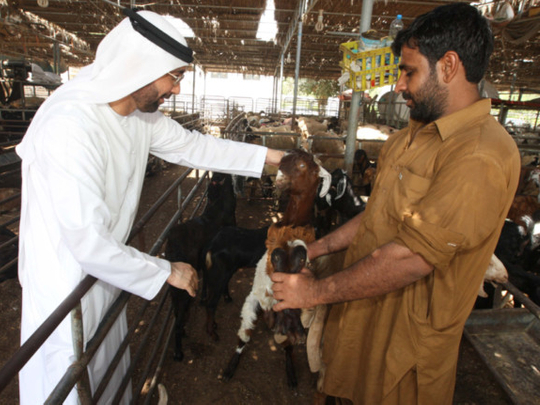
Dubai: Livestock prices are expected to remain the same as last year or even fall ahead of the Eid Al Adha festival of sacrifice in October, a top official said.
Dr Hashim Al Nuaimi, director of the Consumer Protection Department, said market indications point towards enough livestock supply to meet rising demand for goats and other sacrificial animals in the coming weeks.
On Thursday, Al Nuaimi told reporters during a meeting at the livestock market in Dubai’s Al Ghusais area that, based on current information, prices are expected to drop 10-15 per cent or remain unchanged from last Eid Al Adha.
Last year, prices for goats before Eid ranged from Dh500-Dh1,000, depending on the size, weight, variety and other criteria.
A number of goat sellers at the market confirmed that current prices are consistent with last year’s rates.
However, despite repeated official assurances, prices usually peak on Eid day, rising sharply or even doubling overnight.
This year, Eid Al Adha is expected to fall on October 4 or 5.
“Right now, prices are between Dh500 and D1,000, depending on what you’re looking for. A small Somali goat – 10 to 15kg – is the cheapest and the most expensive would be, say, a 40kg-goat from India,” a Pakistani livestock trader said.
“We don’t know what will happen to prices on Eid – it’s all about market forces, supply and demand.”
However, Al Nuaimi said a team from the Ministry of Economy will be present in the market to keep a check on prices.
“They will ask customers if there’s a problem. There should not be a problem, new stock is coming soon. The supply is good,” Al Nuaimi added.
He said there are some 20,000 sacrificial animals available in Dubai at the moment, with a surge in imports expected. Across the UAE, the number of animals is expected to reach 250,000 by the end of September alone.
“There’s a lot of available stock in the market all over the country. If the prices don’t go down, they will at least be the same as last year,” Al Nuaimi assured.
He added that prices will be decided “according to supply and demand” but inspectors will check abrupt or unreasonable hikes.
A meeting with suppliers of animal feed is also on the cards as the availability and price of feed tends to affect the price of animals. Fodder price hikes are an additional cost in keeping animals, which is passed on to the customer.
“We’ll work with them to see there’s enough fodder supply in the market; some people say it affects the price of livestock in the market,” the official said.
In 2012, Al Nuaimi had said during a market inspection that traders would be fined heavily for inflating prices for Eid Al Adha.
Prices typically rise during Eid Al Adha as residents rush to sacrifice a sheep or goat to mark the occasion, which follows the Haj pilgrimage in Makkah.










